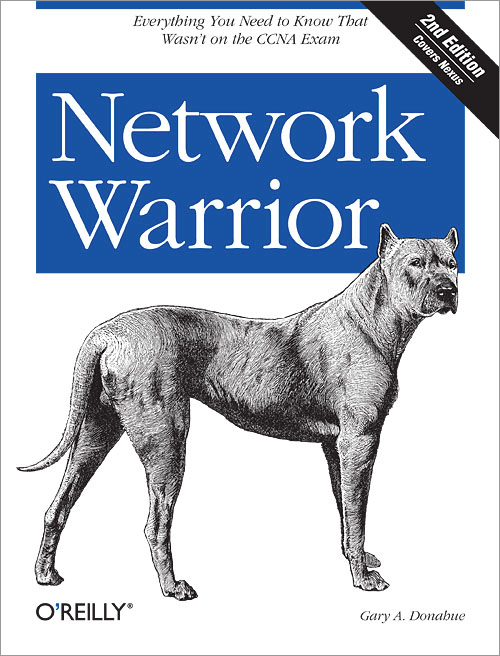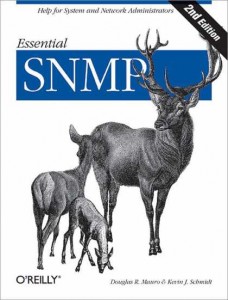
Dear networkers, The Network Warrior is the most naturally written book about networking. By far it’s the only book written by human for humans. The rest are by nerds or teachers for: a -business people, b – nerds. When nerds or teachers hit these audiences, every engineer touched by the shock wave gets bored and falls asleep until the next attempt. This book is opposite. Author’s language speaks instead of describing, wisdom comes from the author’s stories, enlightenment follows as an aftershock. Moreover, the book is highly practical. I was 3 years in networking and saw stuff, but no any single written source had ever delivered so much wisdom to me popping numerous enlightenments on the way.
Needless to say, the book is highly practical. Network engineers got used to manuals, certification guides, RFCs and all other kinds of specifications and descriptions written in an emotionless mesmerising robot-like language. Network Warrior is different. It takes you through tasks, stories, applications, best practices, real world examples, all that multiplied by a talent of a high skilled speaker and a great teacher. You won’t find any theory in the book, only practice, practice, practice, and the best practice.
The book is so amazingly better than any other network engineering manuscript out there that I wish every engineer gets hit with the author’s energy stream and gets as passionate as the author is. Why do I wish so? Because I want every excited engineer out there to be inspirational. To create so much that creation won’t be limited by a state of art network designs, but would fill the gazing gap of network engineering subculture with tons subcultural art, traditions, folklore.
Being quite *nix experienced, I do not hesitate to go through some tutorials for beginners every now and then. It is a pleasure to discover a pieces fo fundamental wisdom hidden there. I want to explicitly remark that a hidden pieces if wisdom can be found only in *NIX tutorials. Most likely because the tutorials are written by a hackers in love in a subject they write about. If you want to know the difference, try to read some Microsoft books written by a so-called technical writers for money. The difference is notable.
Recently I went through The Unix and Internet Fundamentals HOWTO by Eric Raymond. That one is exceptionally good for a beginners. I’ll explain why. The structure of the tutorial’s content delivery is organized in a way every computer introduction should be organized. It starts from a low level and goes to an upper ones. But it’s not about a piece of some hardware or software in an imaginary or omitted infrastructure, it is about the infrastructure in a whole. A pieces of an infrastructure are not described in detail but their role is described. Instead, the tutorial describes the Internet as a whole. It concentrates on the pieces’ interrelation to each other and describes their relations in a detailed, but clear way. And it’s short. It’s takes for about 2-5 hours of reading.
If you have any gaps in your understanding of the patterns of computers and/or Internet operation, you must read it. Normally, it should build a picture out of a jigsaw puzzle for anybody interested. I highly recommend to bookmark the tutorial and to offer it to any fried of yours who is willing to learn more. It is strictly recommended to the ones who suddenly decided to install Ubuntu.

Book is good guide for CCNA security exam preparation. It introduces you into First and third parts are easily readable and perfectly understandable, second part is not. Second part is really bad – it covers basics of 5 unrelated topics and covers them poorly. However, I can not blame the book – most likely it’s been dictated by exam topics.
Generally, the book is comprehensive guide for IINS exam preparation. I would recommend it to everybody who is willing to take the exam regardless of reader’s background expertise. For ones, who does not want to take the exam, but wants to use it for self education, below is the list of topic and my opinion about their coverage level.
Book covers Well:
– Firewalls theory and technologies
– Cryptography technologies, hashing and PKI organization
– AAA
– Network security attacks theory
– Switch port security and EAPOL
Book covers poorly:
– Endpoint security
– VPN tunnels
– SAN security
– VoIP security
– NAC
– Firewall applications: Zone-based and CBAC
When you learn something using practical approach, you can miss small fundamental bits of information. The bits can be useful or useless, but it’s always good to know them. That is the reason I scroll through many Linux tutorials every now and then. Most of them are casual, but I have to highlight a gem I recently found: the Linux basics from Daniel Robbins. They are perfectly structured and there were some points I missed during my self-education.
The articles in Linux Fundamentals series are focused on Linux basics and position themselves as tutorial for preparation to LPI exams. I wouldn’t consider the tutorials as robust exam preparation guide – exam topics are wider than the ones discussed in tutorial. But tutorials are still very good. They are written in a very good easy language with nice input of nerd humour.
http://www.funtoo.org/en/articles/linux/lpi/1
http://www.funtoo.org/en/articles/linux/lpi/2
http://www.funtoo.org/en/articles/linux/lpi/3
http://www.funtoo.org/en/articles/linux/lpi/4
There are few more topic oriented tutorials written by Daniel, like BASH, SED, AWK guides. There is a file system guide for the ones who does not know which file system to choose . I’m too lazy to publish all direct link to the articles here. Just open http://www.funtoo.org/ page and scroll down. You’ll find all you need.

Books covers everything about SNMP, plus something related, plus something unrelated. When I saw the book for a first time, I couldn’t understand how so many pages could be written about such simple thing as SNMP protocol. Reading throughout the book reveled many verbose listings, examples and even chapters which seem redundant. Book covers all possible aspects of SNMP: protocol architecture, SNMP API, programming SNMP, best practices and so on and so forth.
Being too verbose, book has to be red carefully. You might omit some or many chapters depending on information you want to get. Despite of being exaggerated, book is well-written and delivers all topic-related material.
Yesterday I digested learning C++ as a new language paper by Bjarne Stroustrup. I am looking for a “correct” approach to learn programming. Programming science is giant mastodon. Programming is so huge system that it can’t be observed completely even after years of research. There are no professionals, who know all kinds of programming. Even old specialists with several areas of expertise observe only piece of puzzle. My target is to find universal guide into all, or at least most kinds of programming. A guide, that observes the whole mastodon and popularly describes every part of it.
However, the paper was not about my search. The paper is a good introduction into C++. It does not describe syntax of language, but provides a manual, guiding where and how to start learning the language. I noted, that those advises do not apply to C++ only, but applicable for any programming language. The paper is highly recommended to students, who are completely new to programming, as well as to teachers, creating their teaching programs.
I want to note, that if my teachers trained me according Stroustrup’s advises, educational effect would be higher. At least, i wouldn’t have had to discover a difference between standard library and language syntax myself. So if you are not satisfied by your teachers. but not sure where to start this paper is for you.


